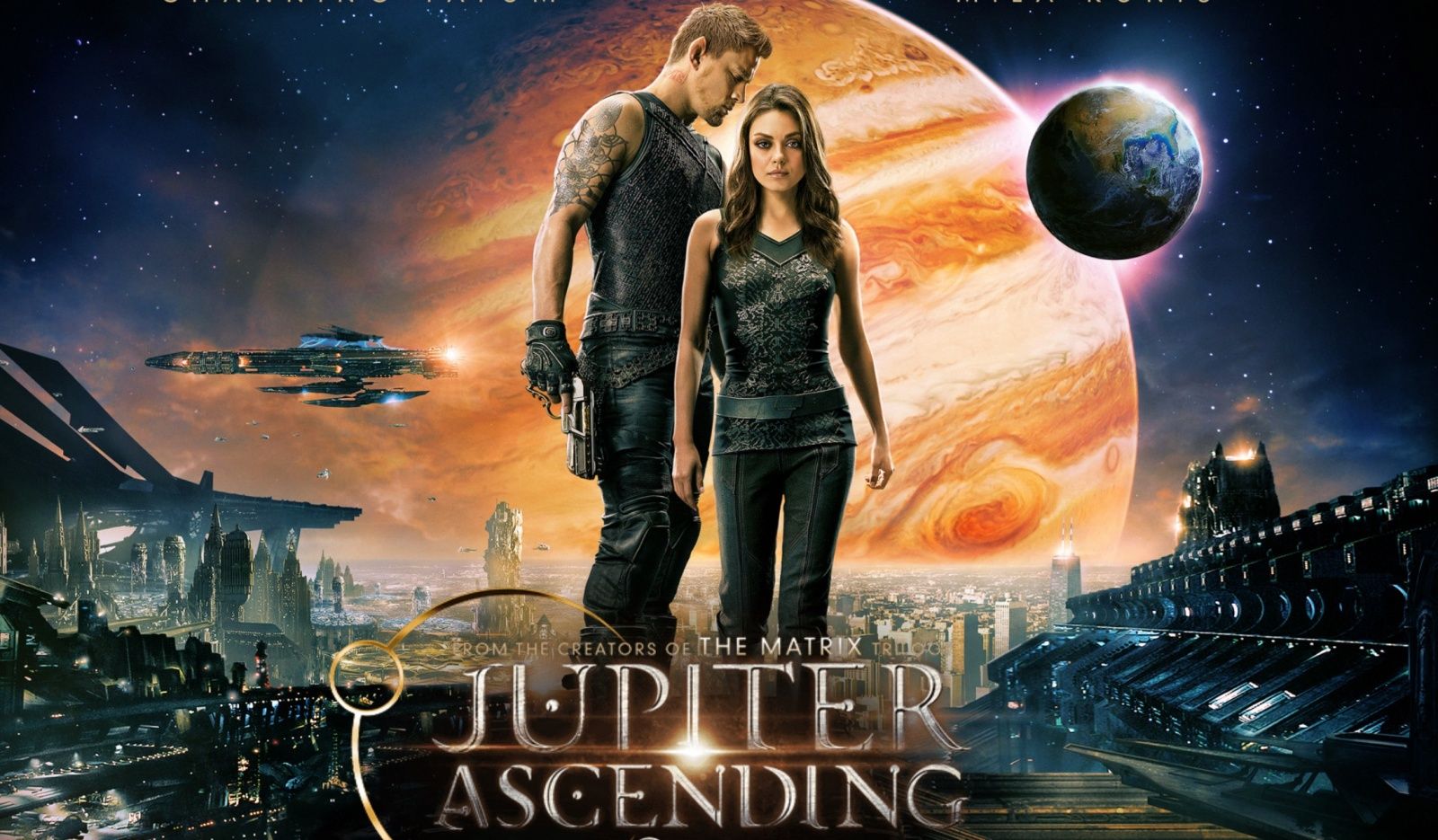Reading the reviews of the Wachowski siblings’ latest film, Jupiter Ascending, on rottentomatoes.com, I was really struck by how epically and majestically every single one of the them ignored the elephant (or possibly alien) in the room. After having seen the film, critiques of the comic book plot ‘not making sense’, or of ‘bad dialogue’ and ‘overblown’ special effects seem so widely missing the mark as to be utterly irrelevant. Jupiter Ascending is a gorgeous excess of imagineering that takes the Wachowski’s unparalleled talent for world-building to new heights, but critiquing it on the basis of being entertainment at all, seems to be the problem to me.
Of course, it is entertaining, and delivers its quota of explosions, cliff-hanging rescues and space battles with aplomb, but I think that’s just not what is interesting, or inspiring, about it. The question I think we should be asking is what are the Wachowski’s really up to in their film-making? Where Jupiter Ascending excels isn’t in a high-budget reworking of the 1930’s comic book genre, it is in the Wachowski’s ability to use that device to tell a much simpler tale. For me, that story is about disclosure, or to use the Wikipedia definition ‘the revelation of suppressed evidence of extraterrestrial life.’ Being set as a Galactic Cinderella story in which our rags-to-riches heroine gets go an interplanetary roller coaster ride is but one layer. The more important one, to me, is that Jupiter Ascending is overtly, clearly and explicitly about passing through the veil of occlusion that keeps our planet in a parochial prison of isolation.
This is beautifully summed up by Channing Tatum’s character Caine Wise telling Mila Kunis’s character Jupiter Jones ‘It can be difficult for people from underdeveloped worlds to hear that their planet is not the only inhabited planet.’
Suspend your disbelief. Suppose for a moment that ‘aliens’ are in fact, real. Certainly, a significant portion of the human population today already believes that. But suppose a smaller, yet still significant portion of the population actually know this, through direct experience. Maybe the Wachowski siblings are actually in touch with an interstellar civilisation through some kind of noospheric plasma conduit induction loop. ( I just made that up.) In which case, seen through the lens of disclosure, Jupiter Ascending makes perfect sense. Its narrative then can be seen as education, rather then entertainment. Galactic infotainment, if you will. Another raising of the imaginal bar towards the boiling point at which the collective consciousness of humanity can accept the reality of sentient life elsewhere without descending into a reflexive spree of xenophobic destruction upon first contact. The thing is that it’s not even necessary for the Wachowski siblings to have an alien implant from which they get script ideas. All that is required is to be alive to the possibility of intelligent extra-terrestrial life. And what I find shocking is how few people are. And how damn medieval that belief system is.
Just to be clear, I have no conclusive proof of the existence of extra-terrestrial life that is likely to convince an oppositional ‘rational skeptic’, nor am I attempting to do so. However, my viewpoint doesn’t require the burden of proof. I am simply asking the question ‘Isn’t it much more likely that there is intelligent life elsewhere, and if so, what’s wrong in living as if that were true?’
This is not just some cold statistical argument about the number of planets and the likelihood of random evolution occurring through some theoretical primal soup in a galaxy far, far away. Although many mainstream evolutionary biologists, astronomers, and other hard scientists support variations on this position.
This is also an argument about our lack of knowledge about ourselves as a species and our origins. (We could also mention here our rapidly growing and seemingly out of control of technological society and complete lack of balance with the biosphere, WTF’s up with that?) Since we don’t know where we come from, couldn’t it potentially be somewhere else? More to the point, galactic civilisation better be out there, or else we- as a planetary civilisation with increasingly brutal weaponry and an underdeveloped control of the urge to use them on other people, are likely to be screwed. I don’t suggest depending upon, or waiting for disclosure to begin sorting out our problems. Indeed that is the aspect of UFO cosmology that I most dislike. A passive ‘let the aliens’ sort it out attitude isn’t helping anyone. On the other hand, being open to the possibility of contacting sentient life elsewhere seems to me to be eminently sensible. And a far as doing whatever we can to encourage outreach to life beyond Earth. Why not? We don’t know what’s out there, so why does being open to it being interesting immediately cause widespread polarising reaction? As UFO ‘followers’ have been known to say: Believe! Believe in a non-specific and very general outcome regarding possible extra-terrestrial contact (within a reasonable and somewhat undefined time period), but Believe anyway. Don’t be that guy complaining there are plot holes in Jupiter Ascending and what are space boots anyway.
There are plenty of exciting and compelling narratives to choose from in the post-disclosure belief systems. If you are inclined to telepathy and synchronicity, consider the 13 Moon Calendar Movement: here’s a great takeaway quote: ‘We as a civilization are living in an artificial hologram caused by a time-space distortion.’ from this introduction.
For a blend of illuminati conspiracy and positive ET contact, definitely check out Cobra, herald of the impending “Event” which will reset the World’s banking system whilst defusing the planet-destroying ‘strangelet’ bombs that have apparently been holding up the good guy’s rescue plan.
Or for a full expose of the ‘Secret Space Program’ go here.
There’s plenty out there to choose from and if you are so inclined, you can certainly find something to believe in that is equally outrageous as Jupiter Ascending….and maybe, just maybe, actually true, because the story about us being alone in the universe as the supreme pinnacle of creation almost certainly isn’t.
My final point is that we cannot even understand our own culture at this moment in time without the ‘myth’ of Disclosure. Try watching Jupiter Ascending through the lens of it being near-future reportage and see how much more sense it makes (and enjoyable it becomes). The problem is that we don’t seem to believe anymore in the boundless possibilities of space, the final frontier. Or, come to mention it in ourselves, the terrestrial human race, and our own boundless potential. Sadly without a unifying dream that includes the possibility of transcension into the galactic beyond, we are likely to wilt as a global culture in the crucible of late-stage capitalism and climate crisis. The global ecological crisis is not likely be solved by taking shorter showers and earnest hand-wringing, but by Big Vision. We need to dream big. Wachowski big. Those who fail this test of imagination are doomed to be movie critics.















